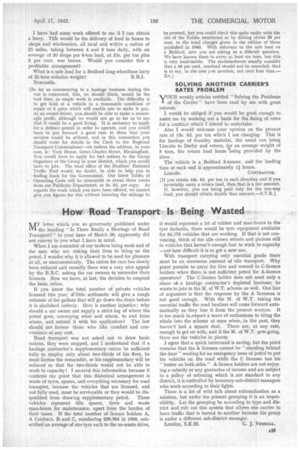How Road Transport Is Being Wasted
Page 25

If you've noticed an error in this article please click here to report it so we can fix it.
MY letter which_ you so generously published under the heading "Is There Really a Shortage of Road Transport?" in your issue of March 20, apparently did not convey to you wha.t I have in mind.
When I am reminded of our tankers being sunk and of the men who are risking their lives to bring us the petrol, I wonder why it is allowed to be used for pleasure at all, or uneconomically. The ration for cars has slowly been reduced and recently there was a very nice appeal by the B.B.C. asking the car owners to surrender their licences. Now we have, at last, the decision to suspend the basic ration.
If you know the total number of private vehicles licensed this year, a' little arithmetic will give a rough estimate of the gallons that will go down the drain before it is abolished entirely. Here is another injustice : why should a car owner not supply a strict log of where the petrol goes, conveying what and whom, to and from where, and submit' it with his application? The law should not favour those who like comfort and convenience at any cost.
Road transport was not asked not to draw basic rations, they were stopped, and I understand that if a haulage contractor's supplementary ration be sufficient fully to employ only about two-thirds of his fleet, he must license the remainder, or his supplementary will be reduced so that the two-thirds would not be able to work to capacity ! I secured this information because it confirms my point that this diabolical arrangement is waste of tyres, spares, and everything necessary for road transport, because the vehicles that are licensed, and not fully used, must be serviceable or they would be disqualified from drawing supplementary petrol. These vehicles represent idle spares, tyres and waste man-hours for maintenance, apart from the burden of their taxes. If the total number of licence holders A, A Contract, B and C, numbering 239,304 in 1938, subscribed an average of one tyre each to the no-waste drive,
it would represent a lot of rubber and man-hours in the tyre factories, there would be tyre equipment available for 34,178 vehicles that are working. If that is not convincing, think of the idle crown wheels and pinions still in vehicles that haven't enough fuel to work to capacity —yet how difficult it is to get a new one.
With transport carrying only essential goods there must be an enormous amount of idle transport. Why grant permits to carry for hire and reward to C-licence holders when there is not sufficient petrol for A-licence _operators? The C-licence holder does not need only a share of. a haulage contractor's depleted business; he wants to join in the M. of W.T. scheme as well. One line of argument. is that the response by the A licensees is not good enough. With the M. of W.T. taking the essential traffic the road hauliers will come forward automatically as they lose it from the 'present sources. It is too much to expect a wave of enthusiasm to bring the whole into the scheme at once when, in the past, they haven't had a square deal. There are, at any rate, enough to get on with, and if the M. of W.T. gets going, there are the vehicles in plenty.
I agree that a quick turnround is saving, but the point remains that the A licensee cannot be "standing behind the door" waiting for an emergency issue of petrol to put his vehicles on the road while the C licensee has his " butter on both sides." A-licence holders are not enjoying a subsidy or any guarantee of income and are subject to a policy of rationing which is not standard in any district, it is controlled by honorary sub-district managers who work according to their lights.
There is a lot of wild talk about rationalization as a solution, but under the present grouping it is an impossibility. Let the grouping be according to type and district and rub out this system that allows one carrier to have traffic that is barred to another because his group is under a different sub-district manager.
London, S.E.22. C. J. YERRALL.




















































